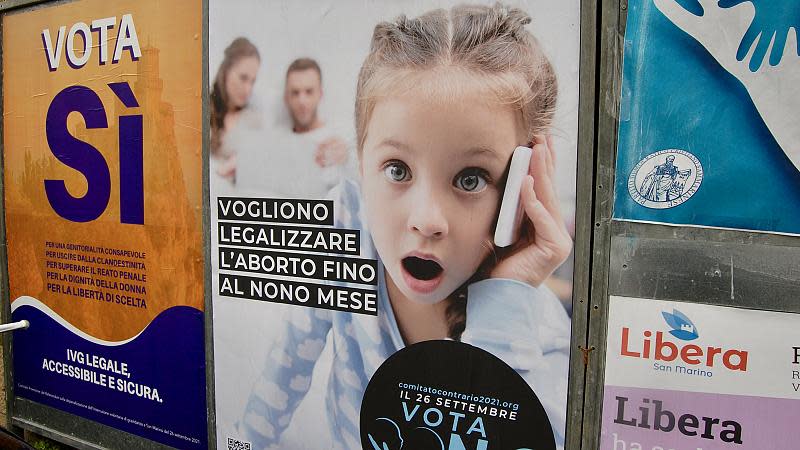San Marino referendum: The big battle for abortion rights in one of Europe's smallest states

Anna Maria found out she was pregnant when she was 33 years old and already mother to a two-year-old daughter. Becoming pregnant again was not in her plans.
But Anna Maria lives in San Marino, a historically Catholic microstate landlocked inside Italy, where abortion is illegal and punishable with at least three years in prison.
“I want to explain what it means to live in a country that doesn’t allow women to freely access abortion, a country that denies its citizens and families the right to self-determination,” she said in anonymous testimony provided to a feminist activist group in the country, the Union of Sammarinese Women (UDS). Anna Maria is a pseudonym.
She suffered from serious postpartum depression after her first child and had been prescribed psychiatric drugs that she says allowed her to live a “normal” life. Now she was left wondering if her medication had damaged the foetus inside her.
“Just like that, my peace of mind vanished,” she said. “What damage had my intoxicated body done to the embryo?”
Taking away the stigma
UDS has been collecting anonymous testimonies from Sammarinese women ahead of a referendum on abortion on September 26, which will decide whether to change the country’s penal code and allow abortion up to twelve weeks of pregnancy.
“We’ve had so many women coming forward with their stories,” explained Karen Pruccoli, one of the founding members of UDS. “We’re like any other country, even if we’re small. We have the same problems and the same needs, and we want the same rights.”
In a park situated at the northern tip of the country, activists from UDS set up a stand with posters and badges in the distinctive purple and orange colours of their campaign, urging residents to vote “Sì!” on Sunday.
There’s an atmosphere of nervous anticipation. UDS was officially founded in September 2019, but the fight for abortion rights in the country began long before that. Feminist politicians and activists proposed successive bills on the issue in 2003, 2014 and 2017, which were dismissed by the country’s parliament one by one.
In March 2019, UDS presented a new bill to legalise abortion. “We were taking advantage of a law that had just been passed which said that all bills had to be discussed and acted upon within six months. We said to ourselves, this is the moment,” Pruccoli told Euronews. But then in August the government collapsed and new elections had to be called. The COVID-19 pandemic six months later further delayed the new government reading the bill.
Tired of waiting and the government’s excuses, UDS chose a riskier course: asking for a referendum. If the Yes campaign loses, they won’t be able to hold another referendum on the topic for three years.
“We had to collect a thousand signatures supporting a referendum in the space of a month,” explained Vanessa Muratori, a board member of UDS and former politician, who was behind the first-ever bill to legalise abortion in 2003.
Mexican Supreme Court decriminalises abortion in 'historic ruling'
Abortion in Gibraltar: Voters say yes in referendum to ease strict law
The organisation ended up collecting 3,000 signatures – and along with it, Muratori says that the “total silence” around abortion was broken.
“We’ve taken away the moral stigma, the finger-pointing,” she said.
Anna Maria’s testimony is one of a number of stories that UDS has collected in the run-up to the vote. She said that doctors in San Marino didn’t talk to her about her options. Medical professionals are not allowed to provide information about abortion and have a duty to report women who they know have had one.
So Anna Maria found herself having to look for answers alone. She said that she found out that the psychotropic drugs she had been taking could have led to serious health issues for the foetus, including congenital heart problems and cognitive impairment.
“I made what was the hardest but most thought-through decision of my life. I never wanted to give birth to a child with severely compromised health and I would not have been able to face it with my own mental health problems,” she said.
“I went to have an abortion – not as a free person in my own country, but secretively in Italy in a private clinic, where I was unaccompanied, uncomfortable and judged.”
Optimism
Muratori says that abortion being illegal creates a Catch-22: because women don’t talk about it, it’s impossible to prevent it from happening or put mechanisms in place to support pregnant women.
“We don’t know how many abortions are taking place. We don’t have any statistics on it because it’s all secret,” Muratori said.
UDS activists think that a Yes result will not just de-penalise abortion in San Marino, but could also act as a stepping stone to other services such as better sex education in schools, access to free contraception and free family planning services.
For Muratori, the current law is “backwards and cruel.”
“It sees a woman as an incubator, not as a human being capable of deciding what is best for her,” she said, hammering her fist on the table in front of her. “If we lose, nothing will change. Women will continue to cross the border alone to get abortions.”
But she is optimistic that the country will vote Yes at the end of the month. “When people are given the opportunity, they always choose to respect the rights of the individual. Let’s hope that San Marino is no exception.”
Every weekday, Uncovering Europe brings you a European story that goes beyond the headlines. Download the Euronews app to get a daily alert for this and other breaking news notifications. It's available on Apple and Android devices.

 Yahoo News
Yahoo News 
